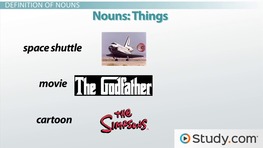- English Language Arts Grade 9 Skills Practice
- English Language Arts Grade 10 Skills Practice
- English Language Arts Grade 11 Skills Practice
- English Language Arts Grade 12 Skills Practice
Explore Vocabulary
Courses for Vocabulary
A well-developed vocabulary is a benefit for high school and college students. At the college level, professors in most areas of the study expect students to produce clear, intelligent writing related to their discipline.
Explore our full library of vocabulary courses:
What is Vocabulary?
The term vocabulary, in its most basic sense, refers to a list of words and their definitions. Traditionally, such a list would be presented in alphabetical order and may be directly related to a unit of study (such as a list of words related to plant growth for a unit on botany). In education, however, the vocabulary definition involves a much richer field of study. Students of all ages, beginning with preschool and kindergarten, benefit from developing a broad, diverse understanding of the English language. Building vocabulary involves much more than simply memorizing vocab words and definitions. Skillful vocabulary activities and lessons should engage students and build understanding. Teachers can keep in mind the following principles:
- Each word can have a variety of meanings or shades of meaning.
- Words can be connected to other words and understood in relation to other words. Starting with known vocabulary, such as ''truck,'' can lead to learning more advanced vocabulary (excavator, diesel, itinerary).
- Word parts can give clues to meaning. For example, ''endear'' (to cause to be liked) is related to the root word ''dear.''
- Vocab words should be put into meaningful context and practiced. Students should use words expressively, in both writing and speech, as well as receptively, looking for vocabulary words in their environment.
- Students can be involved in choosing their own vocabulary words to learn and practice, increasing their motivation.
For English language learners (ELLs), vocabulary is a key part of the education process. English language learners may need to learn some of the basic communication vocabulary that native speakers take for granted. Teachers of ELLs often identify four domains of language: reading, writing, speaking, and listening. Some educators add a fifth domain, which is interaction. In all of these domains, students must develop a functional vocabulary to experience growth and increase their proficiency. Therefore, vocabulary learning is an integral part of ELL programs for learners of all ages.





Lessons and Skills in Vocabulary
Vocabulary is often seen as an elementary topic involving learning lists of words and their meanings. Sometimes vocabulary lists are attached to science or social studies units to help students develop relevant subject-matter word knowledge. In fact, studying vocabulary is important for students of all ages. The ability to communicate effectively relies on an individual being able to comprehend and utilize a wide variety of specific, relevant words, as well as to understand shades of meaning and choose words appropriately. Vocabulary development benefits academic writing, public speaking, employment, and relationship building.
In high school, English language arts (ELA) courses are designed to teach students to be active readers and expert writers, and communicators. Study.com features English Language Arts Skills Practice modules at the ninth, tenth, eleventh, and twelfth-grade levels. Using these modules, teachers have the opportunity to select specific skills and create assignments that allow students to practice in target areas of ELA. Students can practice in four areas of ELA: reading, grammar, writing, and vocabulary.
Available reading skills include analyzing literature, analyzing informational text, analyzing poetry, and literary devices. Each of these broad topics can be broken down into specific practice items, such as word choice, themes, or understatement. Grammar topics include a comprehensive review of English grammar, which is particularly relevant to the language domain of writing. Grammar topics include phrases and clauses; sentence structure; capitalization and spelling; punctuation; grammar conventions; and parts of speech. The writing portion of the skills modules focuses on editing and revision, which is vital to effective written communication. Vocabulary skills include dictionary and thesaurus usage; word choice; determining word meaning; affixes; and word roots. Each of these vocabulary skills has lifelong relevance in enabling students to broaden their vocabulary independently.
Classroom teachers and teachers of ELL students can benefit from access to these practice resources, which can be used to create reviews, quizzes, or homework assignments. In addition, students can identify their own areas of weakness and access these Skills Practice modules to review before a major exam. Honing skills in reading, literary analysis, writing, grammar, and vocabulary building will teach students to be stronger readers and writers, preparing them for both higher education and the workplace.
Vocabulary Test Prep
Prospective California teachers can use Study.com's RICA Exam Test Prep to prepare for their licensure test. This guide reviews important topics in reading instruction, including phonological awareness, letter recognition, sight words, phonics, vocabulary development, and literacy comprehension. These user-friendly lessons and practice quizzes will help test-takers be ready to succeed on the RICA test and put them one step closer to their professional goals.